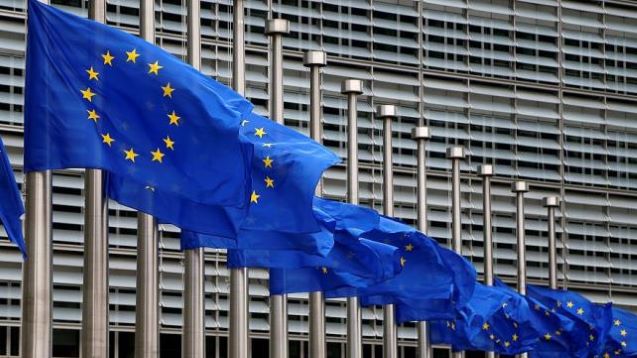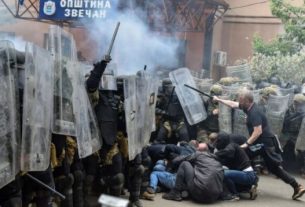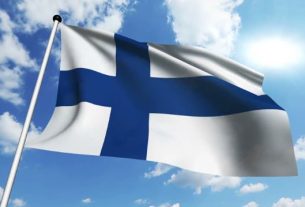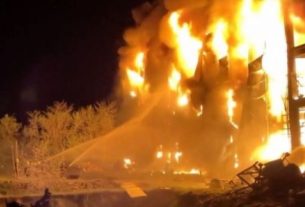EU foreign ministers will Monday discuss slapping Iran with new sanctions over its deadly crackdown on protests and support for Russia in Ukraine, member state Lithuania said. “We will be suggesting additional (Iranian) listings that could be added… to the sanctions list,” said Lithuanian Foreign Minister Gabrielius Landsbergis on Friday during a visit to Berlin. “It would have two parts — for Iranian participation in the war on Russia’s side in Ukraine, but also for the human rights abuses that are happening in the cities of Iran.”
A senior EU official, speaking anonymously, said foreign ministers would likely adopt sanctions at the Brussels meeting on Monday over the repression of protests triggered by the death of Mahsa Amini. She died in the custody of the morality police on September 16, three days after falling into a coma following her arrest in Tehran for allegedly breaching the Islamic republic’s hijab dress rules for women. A European diplomat, speaking on condition of anonymity, said that about 30 names were set to be added to the sanctions list.
The EU had already imposed sanctions against Iran on October 17, targeting the morality police and 11 officials including the country’s telecommunications minister over alleged involvement in repressing the protests. Transfers of drones from Iran to Russia would also be discussed, said the EU official. Kyiv and its Western allies have accused Russia of using Iranian-made drones in recent weeks to carry out attacks in Ukraine. Last weekend, Iran admitted for the first time that it sent drones to Russia but insisted they were supplied to its ally before Moscow invaded Ukraine. The EU is also seeking to confirm reports that Iran had transferred missiles to Russia to be used in Ukraine, the official said.
“If that is proven to be true… we will take action in the form of sanctions,” the official said. Iran has denied supplying missiles to Russia, calling the accusations “completely false”. German Foreign Minister Annalena Baerbock had already indicated earlier this week the 27-member EU was poised to adopt new sanctions, prompting Tehran to accuse Germany of being “provocative” and “undiplomatic”. After talks with her Lithuanian counterpart, Baerbock pushed back, saying that “it is our European understanding that observance of universal human rights is not a national matter, but a universal matter”.
Irish prime minister Micheal Martin on Friday said there was “a window of opportunity” for Britain and the European Union to resolve a dogged dispute over post-Brexit trade in Northern Ireland. Speaking after two days of broader talks between UK and Irish leaders in Blackpool, northwest England, Martin said he had a “positive perspective” following a meeting with new UK counterpart Rishi Sunak.
Martin and Sunak met Thursday as they bid to end the long-running row over the Northern Ireland Protocol which has paralysed power-sharing government in Belfast and put London at loggerheads with Brussels and Dublin. “It’s my assessment that the window of opportunity now does exist,” Martin said as the British-Irish Council summit concluded. In an apparent sign of renewed commitment to ease the post-Brexit frictions in Northern Ireland, Sunak became the first UK prime minister since 2007 to attend the regular gathering. “The space now exists to resolve the outstanding issues pertaining to the protocol by negotiation, and obviously that will need momentum,” Martin added.
“It will need substantive engagement by the EU and UK government to make that a reality.” The protocol was signed separately from the trade and cooperation deal that cemented the UK’s formal departure from the European Union in January 2021. But its implementation has proven a flashpoint for disagreement between the bloc, member state Ireland and Britain — and even threatens a possible EU-UK trade war.
The deal kept Northern Ireland in the European single market and customs union, stipulating checks on goods moving from the rest of the UK to Northern Ireland. That was designed to prevent a “hard” border between Ireland and Northern Ireland — a key plank of the 1998 Good Friday Agreement that largely ended three decades of conflict. However, it has enraged hardline unionists, including the Democratic Unionist Party (DUP), leading to their boycott of the Stormont assembly in Belfast since February.
Elections in May further complicated the situation, after pro-Irish party Sinn Fein won a historic first election.The UK government, which is risking EU reprisals by trying to overhaul the protocol unilaterally through legislation, has threatened to order a new vote. Flanking Martin, senior UK minister Michael Gove said he was not aware of plans to pause the passage of the controversial draft law through parliament. But he insisted the Blackpool talks had been “conducted in a cordial and constructive fashion”.
“We remain optimistic about the opportunities of reaching a resolution,” he added. Europe’s pointman on the negotiations, Maros Sefcovic, said Monday an agreement could be found with the right “political will”. London and Dublin hope a breakthrough over the protocol could pave the way for the restoration of power-sharing in Northern Ireland.__Daily Times





